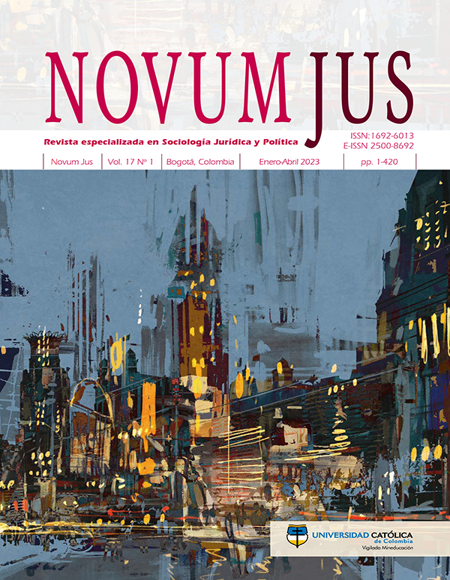
This work is licensed under a Creative Commons Attribution-NonCommercial 4.0 International License.
Authors who publish with this journal agree to the following terms:
- Authors retain copyright and grant the journal right of first publication with the work simultaneously licensed under a Creative Commons Attribution Non-Commercial License that allows others to share the work with an acknowledgement of the work's authorship and initial publication in this journal.
- Authors are able to enter into separate, additional contractual arrangements for the non-exclusive distribution of the journal's published version of the work (e.g., post it to an institutional repository or publish it in a book), with an acknowledgement of its initial publication in this journal.
- Authors are permitted and encouraged to post their work online (e.g., in institutional repositories or on their website) prior to and during the submission process, as it can lead to productive exchanges, as well as earlier and greater citation of published work (See The Effect of Open Access).
Abstract
This article collects partial research results on Gabriel Tarde (jurist, judge in Sarlat, France, criminologist, sociologist; 1843-1904), imitation, and crowd crimes. The objective is to explore the main categories used by the 19th-century French author and understand the general lines of his thought, and why, over a century after his death, his work is regaining interest in the field of global criminology, particularly in Latin America. His work has been translated and studied again with renewed interest, especially in Argentina, where his greatest scholars are found. The main findings of this work have to do with the actuality of some of his ideas, such as the imitability of crime, the rhizomatic nature of society, and the nature of crowds. The most relevant conclusion of this article is that beyond the language or metaphors used by the author (which can be anachronistic and reproduce certain symbolic violence), his work contains keys to understanding many
current social phenomena, particularly the crimes committed by crowds and criminal inventions.
Keywords

References
Blanco, Ana Belén y María Soledad Sánchez. “Can the Economy be Made of Beliefs and Desires? Recovering Gabriel Tarde's Contributions to Economic Sociology”. Athenea Digital. Revista de pensamiento e investigación social 20, núm. 2 (2020): e2192. https://doi.org/10.5565/rev/athenea.2192 (acceso febrero 8, 2023).
Blanco, Ana Belén. “La respuesta microsociológica de Gabriel Tarde a la pregunta ¿Qué es la sociedad?”. Ponencia presentada en VI Jornadas de Sociología de la UNLP, La Plata, 2010.
Caballero de la Torre, Vicente. “Imitation and Distinction. History of Two Theoretical Concepts in Social Psychology: The Legacy of Simmel, Tarde and Bourdieu”. Revista de Historia de la Psicología 42, núm. 2 (2021): 15-20. https://doi.org/10.5093/rhp2021a18 (acceso febrero 8, 2023).
Dávila, Luis Felipe Carolina Moreno Quirós, Cristian Arias Acevedo, Jorge David Vallejo,Lorena Fajardo Puerta, Luis Alejandro Rivera y Paula Durán Suárez. “Violencia simbólica: revisión de los estudios que acuñan el concepto en América Latina (2009-2019)”. Novum Jus 14, núm. 2 (2020): 45-82. https://doi.org/10.14718/novumjus.2020.14.2.3
(acceso febrero 8, 2023).
Dávila, Luis Felipe. “La artesanía del orden social”. Gobernar: The Journal of Latin American Public Policy and Governance 2, núm. 1 (2018): 80-93. https://doi.org/10.22191/gobernar/vol2/iss1/5 (acceso febrero 8, 2023).
Deleuze, Gilles y Félix Guattari. Mil Mesetas. Capitalismo y esquizofrenia. Valencia: Pre-Textos, 1998. Garzón Cárdenas, Ricardo. “Adolfo León Gómez y el presidio en el primer cuarto del siglo XX en Colombia”. Novum Jus 11, núm. 1 (2017): 129-142. https://doi.org/10.14718/NovumJus.2017.11.1.5 (acceso febrero 8, 2023).
Giraldo Ramírez, Jorge. Las ideas en la guerra: justificación y crítica en la Colombia contemporánea.Bogotá: Penguin
Random House, 2015.
Kostenwein, Ezequiel. “Para hablar del crimen, la criminología no basta. Gabriel Tarde, la responsabilidad y el superior social”. Nómadas. Revista Crítica de Ciencias Sociales y Jurídicas 51, núm. 2 (2017): 1-20. https://doi.org/10.5209/noma.51863 (acceso febrero 8, 2023).
Muro, Gabriel. “La reinvención de Tarde. Reseña a Potencias de la invención. La psicología económica de Gabriel Tarde contra la economía política, de Mauricio Lazzarato”. Espectros 4, núm. 5 (2019): 1-12.
Navas-Camargo, Fernanda. “El Sur Global y la realidad social de América Latina: hacia la construcción de nuevos paradigmas”. Novum Jus 14, núm. 2 (2020): 11-13. 10.14718/NovumJus.2020.14.2.1 (acceso febrero 8, 2023).
Nocera, Pablo. “La fotografía como metáfora en el pensamiento de Gabriel Tarde”. Nómadas. Revista Crítica de Ciencias Sociales y Jurídicas 14, núm. 2 (2006): 1-11.
Posada Morales, Juan Esteban. “Las teorías de Gabriel Tarde: una perspectiva analítica del neoliberalismo”. Revista Filosofía UIS 17, núm. 1 (18 de mayo de 2018): 145-66. https://doi.org/10.18273/revfil.v17n1-2018007 (acceso febrero 8, 2023).
Silva García, Germán y Bernardo Pérez Salazar. “Nuevas estrategias de construcción de la realidad del delito en el orden de las sociedades en red”. Utopía y Praxis Latinoamericana 24, núm. 2 esp. (2019): 123-132.
Silva García, Germán, Jairo Vladimir Llano Franco, Nicole Velasco Cano y Angélica Vizcaíno Solano. “Desarrollo de la sociología jurídica latinoamericana”. Opción 35, núm. 25esp. (2019): 1136-1196.
Silva García, Germán, Pablo Elías González Monguí, Angélica Vizcaíno Solano y Bernardo Pérez Salazar. “Abrir la caja de pandora. Retos y dilemas de la criminología colombiana”. Novum Jus 15, núm. esp. (2021): 383-420. https://doi.org/10.14718/NovumJus.2021.15.E.15 (acceso febrero 8, 2023).
Silva García, Germán. “¿El derecho es puro cuento? Análisis crítico de la sociología jurídica integral”. Novum Jus 16, núm. 2 (2022): 49-75. https://doi.org/10.14718/NovumJus.2022.16.2.3 (acceso febrero 8, 2023).
Tarde, Gabriel. Ensayos sociológicos. Volumen 1: La sociología criminal y las muchedumbres. Buenos Aires: Prometeo Libros, 2015.
Tarde, Gabriel. Ensayos sociológicos. Volumen 2: Cuestiones sociales. Buenos Aires: Prometeo Libros, 2015.
Tarde, Gabriel. Monadología y sociología. Buenos Aires: Cactus, 2006.
Tonkonoff, Sergio. “A New Social Physic: The Sociology of Gabriel Tarde and its Legacy”. Current Sociology 61, núm. 3 (2013): 267-282. https://doi.org/10.1177/0011392113477578 (acceso febrero 8, 2023).
Tonkonoff, Sergio. “Individuo, multitud y cambio social. Una aproximación a la teoría social de Gabriel Tarde”. Antípoda, núm. 24 (2016). https://doi.org/10.7440/antipoda24.2016.08 (acceso febrero 8, 2023).
Tonkonoff, Sergio. “Prólogo: Sociología molecular” en Creencias, deseos, sociedades, Gabriel Tarde, 1-26. Buenos Aires: Cactus, 2011.
Vallejos Izquierdo, Antonio Félix. “El debate entre Gabriel Tarde y Émile Durkheim”. Empiria. Revista de metodología de ciencias sociales, núm. 23 (2012): 163-199. https://doi.org/10.5944/empiria.23.2012.834 (acceso febrero 8, 2023).




















